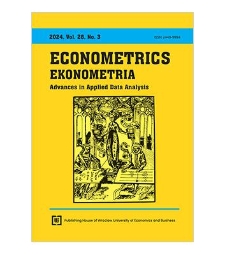Lower Silesian Digital Library contains 103 889 digital objects
Object
Title: Public Support for Emigration Post-EU Accession: An LM Model Analysis
Title in english:
Poparcie społeczne dla emigracji po przystąpieniu do UE: analiza z wykorzystaniem ukrytych modeli LM
Creator:
Description:
Econometrics = Ekonometria, 2024, Vol. 28, No. 3, s. 9-23
Abstrakt:
Publisher:
Publishing House of Wroclaw University of Economics and Business
Place of publication:
Date:
Resource Type:
Resource Identifier:
doi:10.15611/eada.2024.3.02 ; oai:dbc.wroc.pl:128587
Language:
Relation:
Econometrics = Ekonometria, 2024, Vol. 28, No. 3
Rights:
Pewne prawa zastrzeżone na rzecz Autorów i Wydawcy
Access Rights:
Dla wszystkich zgodnie z licencją
License:
CC BY-SA 4.0
Location:
Group publication title:
Object collections:
- Lower Silesian Digital Library > Participants of the Consortium > 04. Wroclaw University of Economics > Periodicals published by the University Publishing House
- Lower Silesian Digital Library > Participants of the Consortium > 04. Wroclaw University of Economics > Periodicals published by the University Publishing House > Econometrics = Ekonometria. Advances in Applied Data Analysis
- Lower Silesian Digital Library > Resources > 2. Czasopisma > Czasopisma współczesne
Last modified:
Nov 12, 2024
In our library since:
Nov 12, 2024
Number of object content hits:
32
All available object's versions:
https://dbc.wroc.pl./publication/167102
Show description in RDF format:
Show description in OAI-PMH format:
| Edition name | Date |
|---|---|
| Public Support for Emigration Post-EU Accession: An LM Model Analysis | Nov 12, 2024 |
Objects Similar
Genge, Ewa
Iwińska, Katarzyna
Kwiatkowska, Małgorzata Jurkiewicz, Zuzanna
Wołkonowski, Jarosław
Wołkonowski, Jarosław
Witczak-Roszkowska, Danuta Okła, Karolina
























